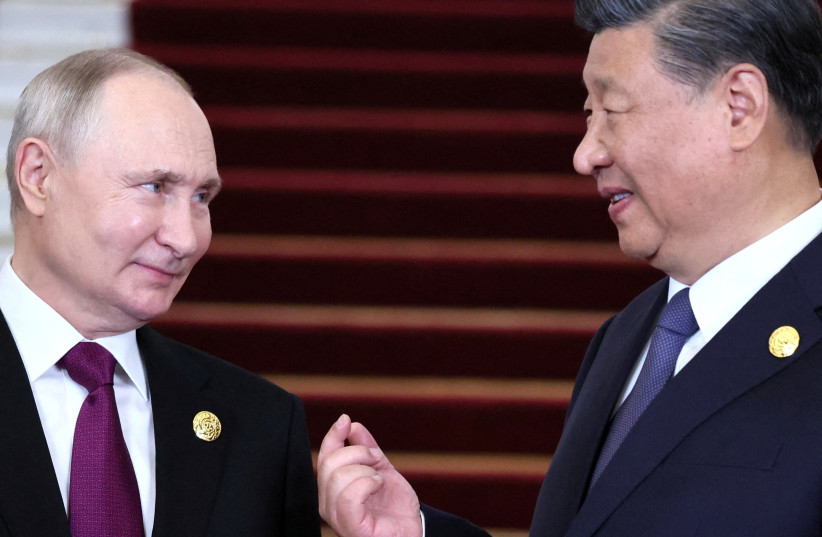International relations professionals are familiar with China’s strategic thinking, marked by centuries of resilience, wisdom, and composure. The Chinese leadership is facing the global strategic developments around it with great calm, patience, and diplomatic engagement behind closed doors that go beyond what is officially proclaimed in statements.
China appears in no hurry to rise to the top of the global system, knowing that most of the ongoing international changes are in its favor. It is crucial for the People’s Republic to avoid any attempts to involve it in conflicts and preemptive wars to eliminate its strategic ambitions before the conditions are favorable for them to mature.
Against this backdrop, Chinese responses to many crises and conflicts worldwide, especially in Ukraine and the Middle East, have been characterized by a high degree of composure and steadfastness in diplomacy. The focus is on realizing the goals of Chinese foreign policy, particularly the consolidation of the principles of international law that China has defended for years.
China's often low-key role in international affairs
These include, of course, respect for the sovereignty of states and non-interference in their internal affairs. These principles are important to Chinese policy because Beijing is tied to the Taiwan issue, and the West keeps interfering in its internal affairs under the pretext of defending human rights and other issues that provoke the Chinese side.
Since the outbreak of the Ukraine war, China’s stance has evolved towards strategic neutrality. Beijing has adopted a position of neutrality despite its growing strategic partnership and “no-limits” friendship with Russia.
This has been described by observers as a middle-of-the-road policy, partly related to Beijing’s desire to avoid escalating strategic disputes and tensions with the US and its Western allies. In addition, China needs to protect key strategic interests with both Ukraine – a main stop on the Belt and Road Initiative – and Russia.

Given the significant economic impact of the war on the Chinese economy, China seeks to strengthen its global role by trying to mediate and thereby play a role in resolving the Ukraine crisis. The final calculation shows that China’s strategic gains outweigh its losses.
Strategic interests
Analytically, it is important to understand China’s position on repeated international crises from the perspective of Beijing’s strategic interests. This includes managing its complex relationships with the United States and NATO allies.
China sees an opportunity in the crises in which its strategic rivals are embroiled, and where their global strength is waning, and can learn from them to deal with such crises and respond in a way that serves its strategic interests in the short and long term.
Since the beginning of the Ukraine crisis, China has seen it as a simulation scenario in case China decides to annex Taiwan by force. The stage is set to observe the West’s military response to comparable crises and to understand Western reactions and alliance networks in similar scenarios that could occur in East Asia.
In this delicate balancing act by Chinese decision-makers, Beijing abstained from voting on two resolutions condemning the Russian military operation in the UN Security Council.
Beijing stressed the close relations between the Chinese and Ukrainian peoples and proposed a mediation initiative that did not receive much attention in the West and was not supported by Russia either, reflecting the state of relations between the two countries.
The Chinese initiative was based on principles that Beijing considers paramount, such as respecting the sovereignty of nations, upholding the principles of the United Nations and international law, ending the “Cold War mentality” and rejecting any unilateral sanctions outside the UN.
Those points ignited the ire of both the Russian and Western sides and underscored Beijing’s attempt to use the crisis to shape international positions in similar situations, such as Taiwan and other countries. It was important for Chinese diplomacy to use the opportunity of the Ukraine war to lead a bloc that is quietly emerging at the level of the global South.
This bloc goes beyond the goals of the BRICS and aims to break Western influence in general. This trend could intensify during the Gaza war as the crisis of confidence between the US-led West and most countries of the South intensifies. Many of these countries view Israel with a resentment that matches their anger at the US, which has relinquished its perceived leadership role in the world order.
Declining American influence
This creates favorable international conditions for Chinese diplomacy, quietly trying to fill the strategic vacuum created by the retreat of American influence. A worrying Chinese signal was recently sent to the West when Chinese Defense Minister Dong Jun announced that Beijing would not abandon its support for Moscow on the Ukraine issue.
During talks with his Russian counterpart Sergei Shoigu, the Chinese minister added: “We have supported you on the Ukrainian issue despite the fact that the US and Europe continue to put pressure on the Chinese side. Even defense cooperation between China and the EU is [now] threatened, but we will not change or abandon our established policy course over this. They should not and cannot hinder normal Russian-Chinese cooperation.” He also stated: “As the two most important and key forces in the world, we should decisively respond to global challenges.”
This revealing statement, which directly and unequivocally expresses China’s support for Russia and does not take a neutral position and presents the two countries as the “most important and key forces” in the world, reflects a clear shift in China’s stance, aimed at exerting influence, demonstrating power, and cautiously abandoning neutrality.
It is hard to interpret this in isolation from the rapidly diminishing global influence of the US and the stalemate in Ukraine, which favor Russia and weaken the West’s ability to achieve its goals in the world’s broader crises.
The writer is a UAE political analyst and former Federal National Council candidate.
